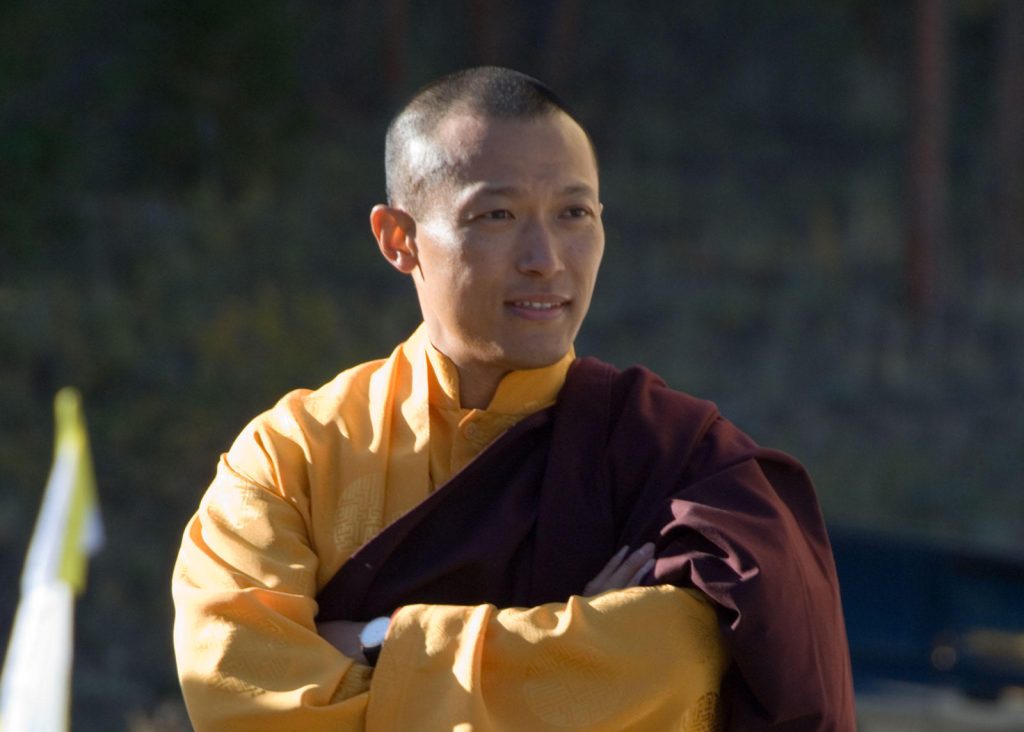Six former attendants of Sakyong Mipham Rinpoche sent an open letter to Tricycle on Saturday detailing a pattern of physical, sexual, and psychological abuse by the head of Shambhala International.
Their accounts cover various time spans between 1994 and 2018 and describe a history of inappropriate behavior by the Sakyong, including binge drinking and a habit of forcefully biting others, as well as pervasive sexism within the organization at large. They also question Shambhala’s allocation of funds to their head and his family, who they say indulged in luxury vacations and expensive cosmetics.
The former attendants, called kusung within Shambhala, are tasked with taking care of the Sakyong as part of their collective duty to protect “the teachings and the community.” These roles are by invitation only by the Sakyong himself, and some kusung live and travel with him.
The letter is the latest disclosure to confirm and expand upon allegations of abusive behavior within Shambhala after the advocacy group Buddhist Project Sunshine released three reports beginning in February 2018, the second of which focused on allegations against the Sakyong. Earlier this month, Shambhala released a report that they commissioned from the law firm Wickwire Holm, which found that the Sakyong likely engaged in sexual misconduct on at least two occasions reported to the investigator.
The letter from the kusung also included a new account of the attempted rape that was alleged in one of the Buddhist Project Sunshine reports to have happened in Chile in 2003. Former kusung Craig Norman claimed he saw the Sakyong and the “young woman from the report” walking into what he thought was a bedroom. A senior teacher closed the door behind them. “The woman came out of the room very upset,” and she spoke with Norman. “I got the impression that Mr. Mukpo had forcefully tried to get her to have sex with him,” he wrote, referring to the Sakyong by his other name, Mipham J. Mukpo. (Sakyong is a title meaning earth-protector.) This claim was not included in the Wickwire Holm report.
Another attendant, Ben Medrano, wrote that as part of his duties he was asked to regulate the Sakyong’s alcohol consumption around this time, adding that he was told “in a vague manner that something very concerning had recently happened in Chile.”
Allya F. Canepa, who served in various positions in Shambhala since 1994, raised a new allegation of misconduct against the Sakyong about an incident that occured in the nineties, when she was a kusung. She says she was “summoned” to the Sakyong’s bedroom, where, while she kneeled at the side of his bed, he “put his hand down my shirt and fondled my breasts and said, ‘please I just want to sleep,’ firmly directing my head to his cock. I obliged and shook it off.”
More than one of the attendants described incidents of “everyday sexism” by Shambhala community members and senior leaders. Former kusung Laura Leslie wrote that she was on the receiving end of inappropriate comments and innuendo from her meditation teacher and Shambhala’s president in 2002, as well as the Sakyong himself.
Related: Will Sanghas Learn from the Scandals in the Buddhist World?
On Monday, Shambhala’s interim board issued a statement saying that they “strongly disapprove of the Sakyong’s behavior described in the kusung’s letter. We will do our part to protect Shambhala culture and community and we do not and will not support the behaviors described.” The statement added that they are now working with internal Shambhala groups to “determine structures of governance” and are also engaged with the conflict consultancy group An Olive Branch, who are gathering their own report and will be issuing recommendations to the community.
Some of the attendants in the letter linked the Sakyong’s actions to that of his father, Chogyam Trungpa Rinpoche, Shambhala’s founder. Medrano, for instance, wrote that he was initially excited to see the Sakyong continue Trungpa’s “crazy wisdom” behavior—behavior that defies cultural norms but is understood to be a teaching from an enlightened guru. Medrano recounted a particular episode that to him seemed reminiscent of Trungpa. After a celebratory dinner, the Sakyong demanded his guests strip naked (most stopped at their underwear). Some of those involved were crying, Medrano wrote, and after he left that night, he said he was told that the Sakyong began biting people, in some cases leaving bruises.
Louis Fitch, who was raised in the Shambhala community, lamented that the “crazy wisdom argument” is still being used to justify the Sakyong’s behavior. “It’s a brilliant tactic,” he wrote. “If something feels or is really fucked up, that’s only because you don’t really understand that it’s there to ‘wake you up.’”
Thank you for subscribing to Tricycle! As a nonprofit, we depend on readers like you to keep Buddhist teachings and practices widely available.
